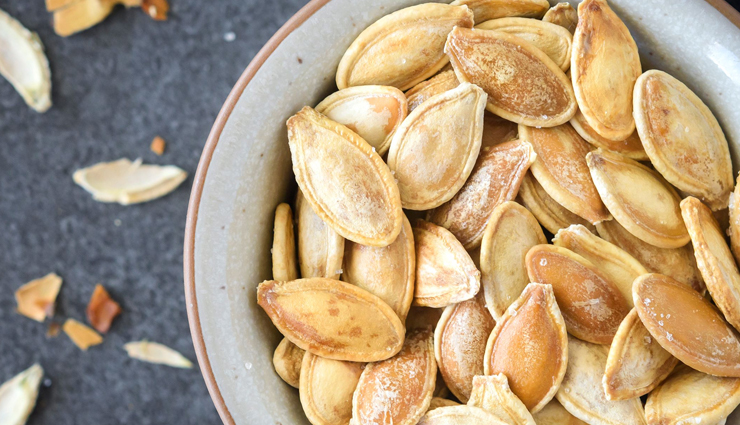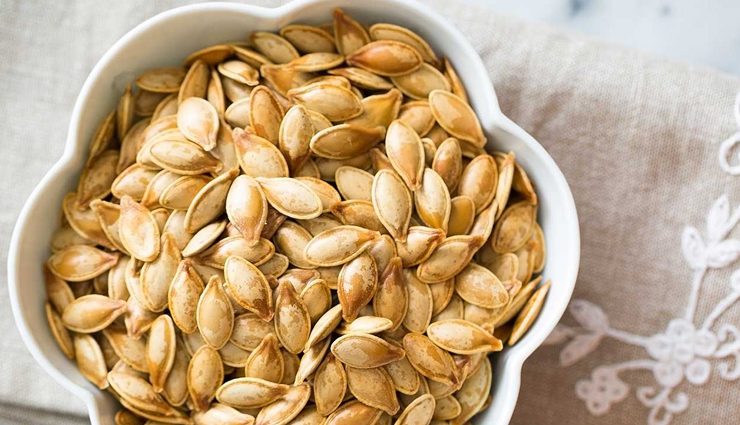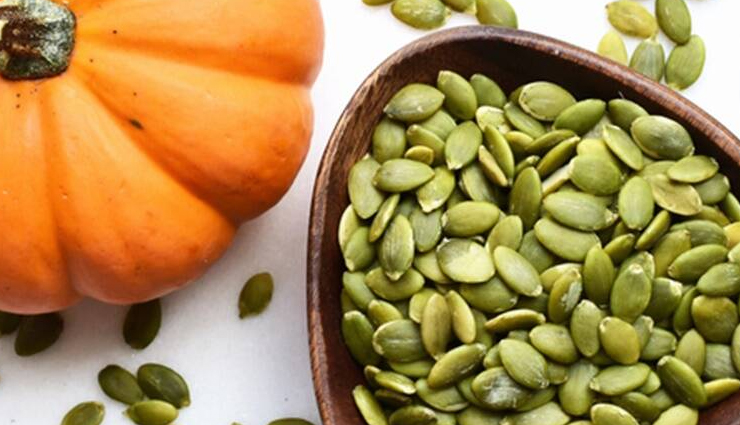- Home›
- Healthy Living›
- 9 Health Benefits Of Consuming Pumpkin Seeds
9 Health Benefits Of Consuming Pumpkin Seeds
By: Kratika Thu, 26 Aug 2021 3:57:28

Pumpkin seeds (pepita) are edible kernels of fruit pumpkin. The seeds, indeed, are concentrated sources of many health-benefiting vitamins, minerals, antioxidants, and essential amino acids such as tryptophan, and glutamate.
Pumpkin fruit is a squash-like gourd in the Cucurbitaceae family of vegetables native to Mexico. Scientific name: Cucurbita pepo. In the Central Americas, hulled and gently roasted pumpkin kernels are popularly known as Pepita.
Fruit pumpkin is grown usually as a field-vegetable crop. However, in some parts of Central Europe (Styrian province in Austria, Slovenia, and Hungary), they are being cultivated exclusively for their kernels at a commercial scale as a major oilseed crop.
Normally, pumpkin fruit is allowed to mature completely in order to gather good-quality kernels. Each fruit may contain up to 250 g cream-white seeds located at its central hollow cavity entangled in mesh-like fibrils.

# Crunchy, delicious pumpkin seeds are high in calories; about 559 calories per 100 g. Also, they are packed with fiber, vitamins, minerals, and numerous health-promoting antioxidants.
# Their high calorific value mainly comes from protein and fats. Moreover, pepitas are especially rich in monounsaturated fatty acids (MUFA) like oleic acid (18:1) that helps lower bad LDL-cholesterol and boosting good HDL-cholesterol levels in the blood. Research studies suggest that the Mediterranean diet that is liberal in monounsaturated fatty acids contributes to preventing coronary artery disease and stroke risk by favoring a healthy blood lipid profile.
# Pumpkin seeds carry good-quality protein. 100 g seeds provide 30 g or 54% of recommended daily allowance of protein. Also, the seeds are an excellent source of amino acid tryptophan and glutamate.
# Tryptophan is converted into serotonin and niacin. Serotonin is a beneficial neurochemical often labeled as nature's sleeping pill. Further, tryptophan is the precursor of B-complex vitamin, niacin (60 mg of tryptophan = 1 mg niacin).
# Glutamate is essential for the synthesis of gamma-amino butyric acid (GABA). GABA, an anti-stress neurochemical in the brain, helps reducing anxiety, nervous irritability, and other neurotic conditions.
# Pumpkin seeds are a very good source of antioxidant vitamin-E; contain about 35.10 mg of tocopherol-gamma per 100 g (about 237% of RDA). Vitamin-E is a powerful lipid-soluble antioxidant. It prevents tissue cells from free radical-mediated oxidant injury. Thus, it helps maintain the integrity of mucosa and skin by protecting from harmful free oxygen radicals.

# Pumpkin kernels are also an excellent source of the B-complex group of vitamins such as thiamin, riboflavin, niacin, pantothenic acid, vitamin B-6 (pyridoxine), and folates. These vitamins work as cofactors for various enzymes during cellular substrate metabolism in the human body. Besides, niacin helps in the reduction of LDL-cholesterol levels in the blood. Along with glutamate, it enhances GABA activity inside the brain, which in turn reduces anxiety and nervous irritability.
# Furthermore, its seeds contain good amounts of essential minerals like copper, manganese, potassium, calcium, iron, magnesium, zinc and selenium.
# Just as in pine nuts, pumpkin seeds too are very rich sources of manganese (provide 4,543 mg per 100 g, about 198% of daily-recommended intake). Manganese is an all-important co-factor for antioxidant enzyme, superoxide dismutase. Therefore, consumption of pumpkin kernels helps develop resistance against infectious agents and scavenge harmful oxygen-free radicals.





